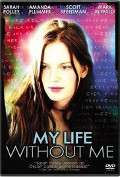
Directed by
Isabel Coixet
106 minutes
Rated M
Reviewed by
Ruth Williams

My Life Without Me
Synopsis: Anne (Sarah Polley) is 23 years old. She lives with her husband, Don (Scott Speedman), and her two daughters in a caravan in the backyard of her mother's house. It's not an easy life, but she manages to find pleasure in the smallest of details; whether it is telling bedtime stories to her children or sharing a joke with her friend at work. Her perspective on life changes when she discovers she has ovarian cancer and the prospect of only two or three months to live.To look at the flyer for this film, you might expect a lavish story that is both romantic and tragic at the same time. The main character, Anne, looks like she is lying on a velvet couch. The lighting emphasises the porcelain quality of her skin. She looks to the camera almost with a 'come hither' gaze. She is actually lying on a seat in a laundromat where she ends up falling asleep from the exhaustion of dealing with her illness. The opening sequence of the film leaves us with no such illusions. Anne stands in the rain, her voice is heard narrating her thoughts. "Who ever would have thought that you would be one of those people that liked to stand in the rain?" We can already guess why.
That's what people do when they find out they don't have long to live. The moment becomes more important. The sensations of rain and wind and the squelch of wet grass between your toes matter; will this be the last time? As a meditation on what it is to die, My Life Without Me, manages to avoid the 'disease of the week' mentality often seen in films that deal with death and dying. Isabel Coixet was not interested in making a sentimental film. This means we can be with Anne as she confronts her own mortality without being overwhelmed with the tragedy of one dying so young.
The film is based on a short story "Pretending The Bed is a Raft' by Nanci Kincaid. The main difference between the film and the original text, is that Coixet chose to have Anne decide not to tell anyone that she was dying from terminal cancer. This avoids the emotional response of her family and friends, allowing her to focus on what she would like to experience in the few weeks she still has left. Some of her choices are selfless; she spends hours making tapes for her daughters' birthdays up until the age of eighteen, while others are selfish; one of her wishes is to make someone fall in love with her and to experience what it would be like to make love to another man.
There is a scene where Anne asks this 'other man' (Mark Ruffalo) to read a few lines from a novel. He chooses "To The Wedding" by John Berger. The lines he reads refer to the way in which a woman's body is being prepared for burial. Anne grabs the book and throws it away. I was interested to know what this book was about. If you consider the director can choose to include or exclude anything she or he likes, I wanted to see what relevance this book had to the story. It turns out to be about a young woman who finds out she is dying of AIDS on the eve of her wedding. The theme in the book offers us "the possibility that even the cruelest fate can be endured and even transcended through courage, love, and determination." Interesting. It sounded to me like Coixet had hidden a clue for those of us who like to read between the lines, so to speak.
There are many special moments. Some make immediate sense, others seem designed to provide us with something to take away and ponder at our leisure. A man plays music on a collection of wine glasses. Anne sees him busking in the street, then later he appears beside the road, totally out of context as she drives to a nearby country town for her last date with her lover. Supermarket shoppers suddenly start dancing in slow motion as Anne narrates, "No-one ever thinks about death in a supermarket." Coixet delivers a film that is both brutally realistic and yet refreshingly whimsical at the same time.
Deborah Harry does justice to the role of Anne's mother, a woman whose broken dreams have left her with a bitterness that has become her only way of relating to the world. Alfred Molina has a short but impressive role as Anne's incarcerated father. It's hard to imagine that a film made about a young woman dying could be anything but maudlin. My Life Without Me has managed to be just that. What could have been depressing turns out to be inspiring. You may not make the same choices as Anne, but it's hard not to find yourself wondering just what you might do if it was your life without you.

Want more about this film?


Want something different?




